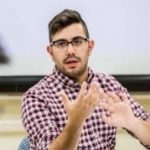Jul 28, 2021
Fact Sheets and Guides
Resources for Social Science Students Navigating Graduate School and the Job Market
Authors:
Graduate school and the subsequent transition from graduate school to the job market can feel overwhelming and confusing for many students. This guide is designed to connect emerging scholars in the social sciences—particularly those already enrolled in a doctoral degree program or preparing for the job market—with existing resources that can help them both be successful in graduate school and navigate the job market after they have completed their degree.
The guide is aimed at social scientists interested in both academic and nonacademic settings. Those who are currently undergraduate students should check out our resources under “Are you considering graduate school?”
Navigating graduate school and the job market can feel especially challenging for students who are underrepresented within the social sciences due to disparities in PhD enrollment and graduation rates, an underrepresentation of academics of color in research, a scarcity of mentors who are people of color, and a lack of professional development opportunities geared toward scholars of color. Resources for Latino students are especially lacking, even though Latinos make up an increasing number of graduate students. To help fill this gap, this guide includes resources (marked with an asterisk: *) that speak to the experiences of Latinx students, as well as students from other historically underrepresented groups. These resources explore topics such as navigating academia as a first-generation student, racism in academia, and funding opportunities for scholars from underrepresented groups.
Are you currently a doctoral student?
The links below provide resources on goal-setting in graduate school, funding opportunities open to graduate students and early career scholars, and strategies for students to successfully engage with their professional field.
- Goal-setting and Time Management in Graduate School
- Funding Opportunities and Grant Writing
- Successfully Engaging with the Field While in Graduate School
Are you an advanced graduate student preparing for the job market?
The links provide information on postdocs, the academic job market (including positions in community colleges and four-year colleges and universities), and the nonacademic job market (e.g., positions in government, nonprofit research centers, advocacy organizations, and for-profit businesses). Resources range from guidance on looking for different types of positions and reviewing application requirements, to tips for successful interviews.
Are you considering graduate school?
It’s never too early to start thinking about graduate school. Many resources exist to help you learn more about graduate school and navigate the application process. Here we include links to just a few of the resources that provide an overview of the graduate school experience and help you determine whether graduate school is right for you.
- The Professor Is In, by Karen Kelsky, is a career guide for graduate students preparing to enter the academic job market.
- A Field Guide to Grad School: Uncovering the Hidden Curriculum, by Jessica McCrory Calarco, covers the graduate school process, from choosing a program to navigating the job market and beyond.
- Hooded: A Black Girl’s Guide to the PhD, by Malika Grayson, provides a Black woman’s testimonial on the graduate school experience in a STEM field.
- Pathways to Science has a toolbox of resources on applying to graduate school. While this website focuses on STEM disciplines, many lessons are also transferable to the social sciences.
- Applying to Graduate School: Tips, Timeline, and Tools of the Trade is a resource from the Committee on Institutional Cooperation that walks through the graduate school application process.
For additional resources, consider reaching out to your undergraduate school’s career office (many will see you even if you’ve already graduated) and exploring other schools’ websites. Many colleges and universities have compiled helpful resources aimed to support folks considering applying for graduate school. For example:
- Duke University has various resources, including advice on choosing a graduate school and preparing a strong application.
- The University of Pennsylvania has an overview of considerations while planning for graduate school.
- Stanford University’s Guide on Getting Into Grad School provides questions to help students decide whether graduate school is the right choice, along with timelines to prepare their application.
Finally, students should reach out to their undergraduate advisor or work supervisor, as these figures may be able to serve as mentors throughout the process or connect students with other individuals who can provide support. Even though it can be intimidating, networking is important and helpful!
Developing the guide
The authors compiled resources in each guide that best speak to each topic area. We prioritized resources developed by universities and reputable nonacademic institutions, along with peer-reviewed resources. In some cases, we also included helpful websites, blogs, and articles representing a wide range of perspectives from students and professionals. The vast majority of the resources are publicly available (the notable exception being books), and links are active as of July 2021. Language for the resource descriptions is drawn largely, if not exclusively, from the original sources. We use the terms “Hispanic,” “Latino,” and “Latinx” interchangeably throughout this guide.
Acknowledgements
We would like to thank Elizabeth Wildsmith, Maria Ramos-Olazagasti, Melissa Perez, Emily Nestel, and Ana León-Santos for their work on this guide. We would also like to thank the Steering Committee of the National Research Center on Hispanic Children & Families, along with Stephen Aguilar, for their helpful review and edits on this product.
Editor: Brent Franklin
Designer: Catherine Nichols
About the Authors
Elizabeth Villegas is a principal research analyst for the Education and Child Development department at NORC at the University of Chicago. Dr. Villegas is an interdisciplinary scientist who researches culturally and linguistically diverse populations and their experiences affecting health, education, and well-being. She has conducted applied community-based research in areas of socio-emotional development, health and mental health, racial and ethnic disparities, cultural and linguistic diversity, and sociological issues.
Michael López is vice president for education and child development at NORC at the University of Chicago. He is a nationally recognized expert, with over 30 years of experience conducting applied policy research with low-income, culturally and linguistically diverse populations. Dr. López also has worked to expand mentoring opportunities for early career scholars and to increase the racial and ethnic diversity of the next generation of researchers.
Kevin Ferreira van Leer is an assistant professor in child & adolescent development at California State University, Sacramento, with experience in both academic and nonacademic settings.
Lorena Aceves is a Society for Research in Child Development (SRCD) federal executive branch policy fellow with the Administration for Children and Families’ Office of Head Start. Dr. Aceves is a first-generation Latina scholar who recently completed her PhD in Human Development and Family Studies at the Pennsylvania State University.
Renee Ryberg is a research scientist in the education research area at Child Trends. Trained as a life-course sociologist and demographer, Dr. Ryberg conducts equity-focused research to understand how youth make the transition from adolescence to adulthood in a way that helps them flourish as adults.
About the Center
The National Research Center on Hispanic Children & Families (Center) is a hub of research to help programs and policy better serve low-income Hispanics across three priority areas: poverty reduction and economic self-sufficiency, healthy marriage and responsible fatherhood, and early care and education. The Center is led by Child Trends, in partnership with Duke University, University of North Carolina at Greensboro, and University of Maryland, College Park. The Center is supported by grant #90PH0028 from the Office of Planning, Research, and Evaluation within the Administration for Children and Families in the U.S. Department of Health and Human Services.
The National Research Center on Hispanic Children & Families is solely responsible for the contents of this brief, which do not necessarily represent the official views of the Office of Planning, Research, and Evaluation, the Administration for Children and Families, or the U.S. Department of Health and Human Services.
Copyright 2021 by the National Research Center on Hispanic Children & Families.


